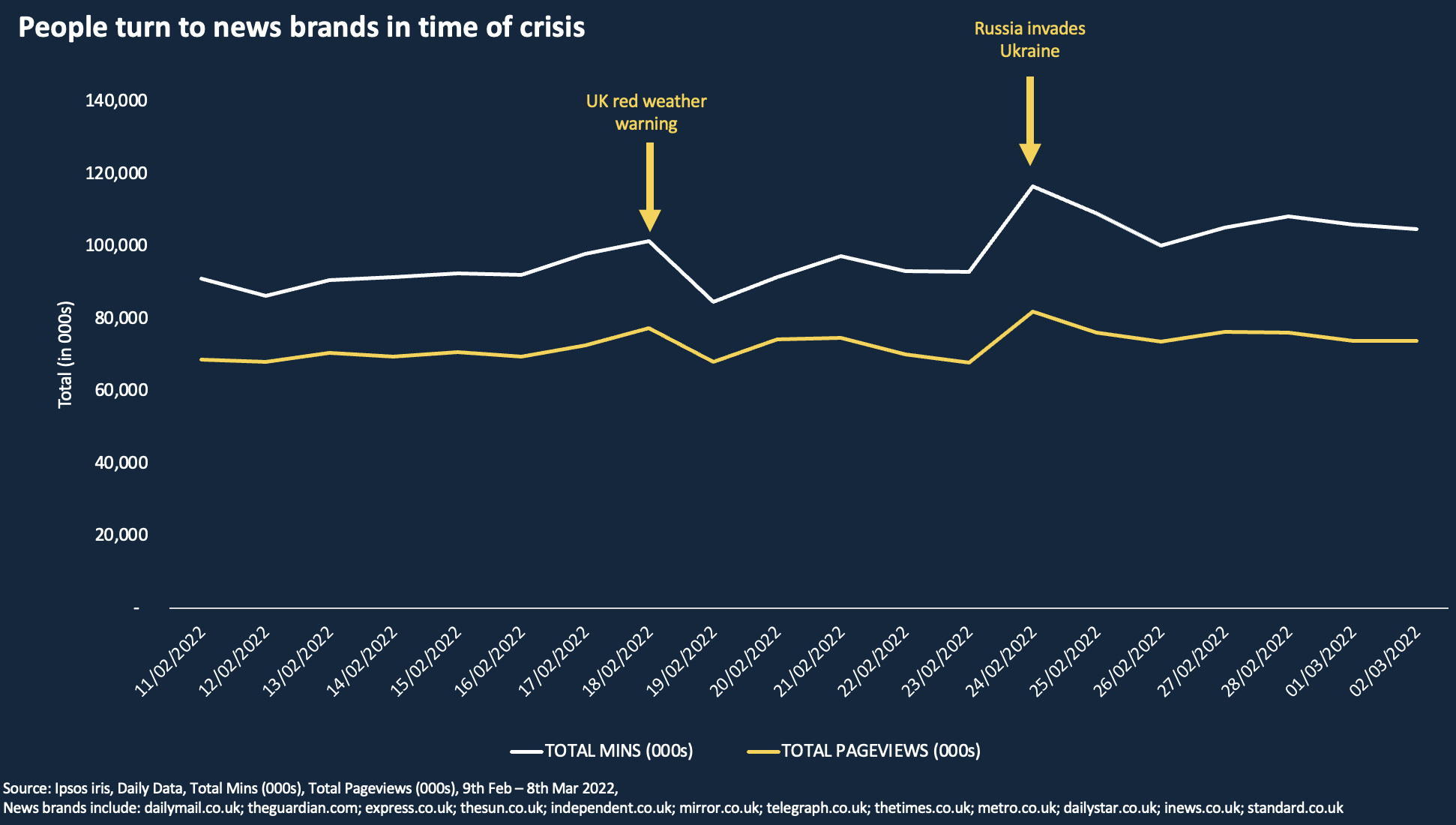Turning to trusted sources in troubling times

Opinion
As the latest PAMCo data reminds us, people are reading news brands to understand the complexities of what is happening, as opposed to casual browsing.
Today marks two years to the day since the historic announcement by Boris Johnson imploring us all to stay at home to stem the rising tide of coronavirus pandemic. We could not possibly have foreseen what the next 24 months would hold. Unsurprisingly, Covid has dominated the news cycle for all of those months and despite the recent rise in infections, it does indeed feel as if we are learning to live with it.
However, it feels as though we’ve jumped from one crisis to another (albeit of a very different kind) over the last few weeks as we have watched aghast as Russia invaded Ukraine. There are heartbreaking stories being played out of those fleeing for their lives, told by journalists risking their own lives to report from the frontline.
What these national and international crises have served to reinforce is the critical role of quality news and journalism, sitting at the very forefront of providing trusted and accurate information against a backdrop of disinformation and misinformation.
News brands provide this at scale, offering a potent combination of fact and opinion that help people navigate information and form opinions. The latest readership figures from the industry currency PAMCo published today (see table, below) show that more than 24 million people are reading UK national news brands every single day, 40 million each week and 46 million each month across print and digital.
(Click the above image to enlarge in a new browser window)
In times of crisis, the need for quality journalism is even greater. On the day the story broke of Russia’s invasion of Ukraine, UKOM data from Ipsos Iris (which provides the digital inputs for PAMCo) showed a 25% increase in time spent on UK national news brand websites compared to the previous day.
Furthermore, in the seven days post-invasion, we spent a staggering 106 million minutes a day reading news brands online on average (an increase of 13% and over 12 million minutes a day from the previous seven days).
What fascinates me is that while the number of page views also increased in the seven days post-invasion, it was by a lower amount of 5%. It demonstrates that people are reading news brands to understand the complexities of what is happening, as opposed to casual browsing.
These patterns reflect what we learned from our World Without News research published in 2020, which showed news brands stand apart from other news sources in helping people to make sense of the world – something we called calibrating.
To be able to calibrate is one of the most important goals for readers, with 82% of news consumers in the research agreeing that ‘the news helps me to make sense of complex issues’ and eight in 10 agreeing ‘the news is a good way of knowing what other people think’.
(Click the above image to enlarge in a new browser window)
Interestingly, the Ipsos Iris data also highlights how news brands help people to achieve another goal identified in our research – the goal of ‘survive’. This is about using information to avoid danger or setbacks likely to derail people’s arrangements or plans. The uplift in time spent on national news brand websites on the day of the February red weather warnings is a perfect illustration of this in practice.
We witnessed how essential journalism was to people throughout the Covid pandemic, with two thirds agreeing with the statement ‘I appreciate and value journalism more since the coronavirus pandemic’. And it remains critical, as much as ever, that we have access to trusted, accurate information in these uncertain times.
From other research we’ve carried out we know that for six in 10 news readers, news brands are the most trusted source for keeping informed about global and national issues.
The events happening in Ukraine have made me and many others value our news brands more than ever before. In our World Without News research, seven in 10 people agreed that ‘a world without journalism would harm democracy’.
The Times’ head of digital Edward Roussel expressed it very eloquently when he said: “The trend that we’re seeing is that in moments of crisis… you see this shift towards trusted brands.”
Journalism is a fundamental part of the equalities and freedoms we enjoy every day, provided at scale by news brands, and something we should never take for granted.
Denise Turner is director of research and insight at Newsworks





